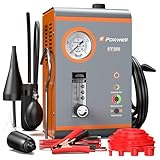If you’re trying to locate hidden plumbing leaks, sewer gas smells, or vent pipe failures, a plumbing smoke test machine is one of the most effective diagnostic tools you can own.
While dedicated municipal-grade smoke blowers can cost thousands of dollars, there are several high-performing smoke machines available in the $120–$400 range that plumbers, inspectors, and serious DIYers successfully use for plumbing diagnostics.
In this guide, we’ll review the 4 best plumbing smoke test machines, compare their features, and help you choose the right one for your needs.
1. FOXWELL ST203 Smoke Machine
The FOXWELL ST203 is one of the most popular smoke leak detectors on Amazon, and for good reason. It features a built-in air pump, allowing you to generate and push smoke into plumbing systems without needing an external compressor.
Why It Works for Plumbing Smoke Tests
Although marketed for automotive systems, the ST203 produces thick, mineral-oil-based smoke that works extremely well for drain and vent diagnostics when used with proper adapters.
Key Features
- Integrated air pump
- Adjustable flow control
- Safety shutoff protection
- Durable metal housing
Best For
- Plumbers performing regular smoke testing
- Property inspectors
- Larger residential systems
Pros
✔ Strong, dense smoke output
✔ Built-in pump (no external air source needed)
✔ Reliable and durable
Cons
✘ Slightly higher price than entry-level models
If you want the most versatile and professional-grade option under $400, this is it.
2. AUTOOL SDT206 Smoke Leak Detector
The AUTOOL SDT206 offers similar functionality to higher-end machines but at a more accessible price point. It also includes a built-in air pump and produces consistent smoke output suitable for residential plumbing systems.
Why It’s a Smart Pick
The SDT206 balances affordability with power. For plumbers who need a dependable smoke machine without paying premium pricing, this is an excellent choice.
Key Features
- Internal air compressor
- Quick smoke generation (within seconds)
- Portable carry handle
- Overheat protection
Best For
- Small plumbing businesses
- Rental property maintenance
- Regular home diagnostics
Pros
✔ Great price-to-performance ratio
✔ Easy to operate
✔ Reliable for repeated tests
Cons
✘ Slightly less airflow than top-tier units
3. Solary SDT-106 Smoke Machine
The Solary SDT-106 is a compact yet capable smoke machine that works well for residential plumbing systems. It’s especially popular among DIY users because of its balance of price and functionality.
Why It’s Worth Considering
If you don’t perform smoke tests daily but want something reliable when needed, this model offers excellent value.
Key Features
- Built-in air pump
- Fast smoke production
- Lightweight design
- Easy setup
Best For
- Homeowners with persistent sewer odor issues
- DIY plumbing diagnostics
- Small-scale vent inspections
Pros
✔ Affordable mid-range option
✔ Compact and portable
✔ Simple to use
Cons
✘ Not ideal for very large commercial systems
4. ANCEL S3000 Smoke Machine
If you’re looking for an entry-level smoke machine that still gets the job done, the ANCEL S3000 is one of the most affordable options on Amazon that includes a built-in pump.
Why It’s a Good Budget Choice
Despite its lower price, it produces sufficient smoke density for most residential plumbing leak detection tasks.
Key Features
- Integrated air pump
- Compact body
- Beginner-friendly controls
- Quick heat-up time
Best For
- Occasional DIY use
- Light plumbing diagnostics
- Homeowners troubleshooting sewer smells
Pros
✔ Budget-friendly
✔ Portable
✔ Easy to operate
Cons
✘ Not as powerful as higher-end machines
✘ Best suited for small systems
How to Use a Smoke Machine for Plumbing Testing
Here’s a simplified overview:
- Seal all drain openings and fixtures.
- Insert the smoke hose into a cleanout or roof vent.
- Turn on the smoke machine.
- Watch carefully for smoke escaping from cracks, fittings, or wall penetrations.
Where smoke appears, there’s likely a leak, vent issue, or failed connection.
Always use proper ventilation and non-toxic smoke fluid.
What to Look for in a Plumbing Smoke Test Machine
1. Built-In Air Pump
This is critical. Machines with integrated compressors are far easier to use.
2. Smoke Density
Thicker smoke reveals leaks more clearly.
3. Safety Features
Look for temperature protection and automatic shutoff.
4. Portability
If you’re moving between job sites, a compact unit matters.
Frequently Asked Questions
Can automotive smoke machines be used for plumbing?
Yes. Many plumbers use automotive smoke machines because they generate safe, visible smoke. With proper adapters, they work effectively for plumbing diagnostics.
How much does a plumbing smoke test machine cost?
On Amazon, quality options range from $120 to $400 — far less than commercial municipal systems that cost thousands.
Is the smoke safe indoors?
Most machines use mineral oil–based smoke that is non-toxic, but always ensure ventilation and follow manufacturer guidelines.
Do I need an external air compressor?
Not if you choose a model with a built-in air pump (all four listed above include one).
Can smoke testing find sewer gas leaks?
Yes. Smoke testing is one of the most reliable methods for identifying sewer gas entry points in residential plumbing systems.
Final Verdict
If you want the most reliable all-around performer, go with the FOXWELL ST203.
If you want strong performance at a lower price, AUTOOL SDT206 is an excellent choice.
For mid-range DIY use, Solary SDT-106 delivers great value.
And if you’re just getting started, ANCEL S3000 offers an affordable entry into plumbing smoke testing.



